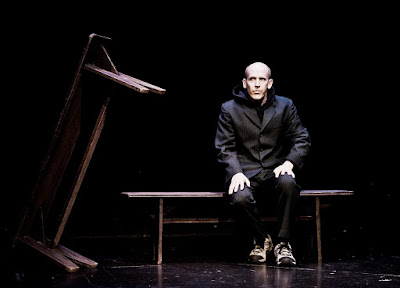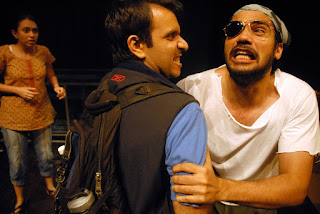3 DAYS, 3 PLAYS!!!
Over time, I’ve learnt to flash a cute grin when I’m being accused of not watching enough plays. I quickly shift the blame to a hectic work schedule but I’m sure most people don’t buy that excuse. Anyway, I do genuinely try to bait Murphy and his annoying law to make it for a play as often as I can (one of the ways of doing that is not announcing plans to watch a particular performance until I’m at the venue). This past week, quite by chance, I was successful thrice in three days. On Tuesday, I had a date with Ramu Ramanathan’s Mahadevbhai, on Wednesday Beckett beckoned with First Love and on Thursday, after juggling an assignment at the last moment, I managed to tip my hat to Savitribai Phule in Sushma Deshpande’s Vhai Mee Savitribai. It’s the kind of achievement that elicits all sorts of clichés and I’m truly having a tough time keeping phrases like ‘my joy knows no bounds’ out of this piece.
Beginning from the beginning (can’t keep all clichés out!), Mahadevbhai (1892 – 1942) was a play I’ve wanted to watch for a very long time. Over the past nine-odd years, Mahadevbhai has had over 200 shows, some even in  Mahadevbhai Desai’s village in Gujarat. Like most Ramu Ramanathan plays I’ve seen, this one too blends history with the contemporary. Jaimini Pathak takes the audience through the story of the freedom fighter, who assisted Mohandas Gandhi until his death in 1942. Jaimini switches without much effort between playing various political leaders and the narrator. I only wish he would get a haircut and stop flicking his hair like Barrister Indrajit Chaddha (Amrish Puri) from Damini. Ditching clichés (like sitting with his legs folded to one side, as Gandhi is portrayed usually), Jaimini makes us aware of the little nuances that differentiated Jinnah from Nehru and Ambedkar from Gandhi. Mahadevbhai goes past that very dangerous phase between being didactic (read, boring) and sermonising (read; preachy). Unlike boring history books, Mahadevbhai beautifully incorporates the humane aspect of the freedom struggle -- Gandhi's letters to Mahadevbhai's father, for instance, subtly tell us of the sacrifices endured -- and that's the power of a play.
Mahadevbhai Desai’s village in Gujarat. Like most Ramu Ramanathan plays I’ve seen, this one too blends history with the contemporary. Jaimini Pathak takes the audience through the story of the freedom fighter, who assisted Mohandas Gandhi until his death in 1942. Jaimini switches without much effort between playing various political leaders and the narrator. I only wish he would get a haircut and stop flicking his hair like Barrister Indrajit Chaddha (Amrish Puri) from Damini. Ditching clichés (like sitting with his legs folded to one side, as Gandhi is portrayed usually), Jaimini makes us aware of the little nuances that differentiated Jinnah from Nehru and Ambedkar from Gandhi. Mahadevbhai goes past that very dangerous phase between being didactic (read, boring) and sermonising (read; preachy). Unlike boring history books, Mahadevbhai beautifully incorporates the humane aspect of the freedom struggle -- Gandhi's letters to Mahadevbhai's father, for instance, subtly tell us of the sacrifices endured -- and that's the power of a play.
From the pre-independence era on day one, Samuel Beckett's First Love on day two was a jump across vastly different sensibilities. While Mahadevbhai's story ends in 1942, Beckett's was written in 1946 so, at least in terms of timeline, the two plays were rather similar. At the most, on e could compare also the two self deprecating narrators. But First Love, in true Beckett style, attacked me with stark, dark words; and the wry sense of humour was just the twist of the knife that would finish the job. The performance started with a short introduction by the director Judy Hegarty Lovett, which I don't really remember, such was excitement of hearing Beckett's words. I had hyped up this performance way too much in my head and I was terribly afraid that it wouldn't live up to my expectations (I have seen enough Beckett works being butchered to have faith in anyone doing a decent job of it). So, when Conor Lovett began his piece, and the audience laughed along at the dark humour and he stood firm in one position, in the centre of the stage, I wondered, slightly disappointed, if this was going to be a standup comedy act with an existential twist. But Conor and Beckett (he was an evil man, I tell you) were only taking us through a dark tunnel into an even darker space so they could have us all alone (just like the narrator, who is surrounded by two bare trees on either side, a huge mound of garbage behind him and a cold, dark stream before him). In that pure darkness, Beckett stripped us down to our basest level and the sheer morbidity of the tale that Conor related made me feel delightfully normal. This was quite a great performance and I wanted to share it with as many of the few friends who truly understood Beckett’s existentialism and I practically forced a friend to ditch client meetings and go watch the show in Delhi later in the week.
e could compare also the two self deprecating narrators. But First Love, in true Beckett style, attacked me with stark, dark words; and the wry sense of humour was just the twist of the knife that would finish the job. The performance started with a short introduction by the director Judy Hegarty Lovett, which I don't really remember, such was excitement of hearing Beckett's words. I had hyped up this performance way too much in my head and I was terribly afraid that it wouldn't live up to my expectations (I have seen enough Beckett works being butchered to have faith in anyone doing a decent job of it). So, when Conor Lovett began his piece, and the audience laughed along at the dark humour and he stood firm in one position, in the centre of the stage, I wondered, slightly disappointed, if this was going to be a standup comedy act with an existential twist. But Conor and Beckett (he was an evil man, I tell you) were only taking us through a dark tunnel into an even darker space so they could have us all alone (just like the narrator, who is surrounded by two bare trees on either side, a huge mound of garbage behind him and a cold, dark stream before him). In that pure darkness, Beckett stripped us down to our basest level and the sheer morbidity of the tale that Conor related made me feel delightfully normal. This was quite a great performance and I wanted to share it with as many of the few friends who truly understood Beckett’s existentialism and I practically forced a friend to ditch client meetings and go watch the show in Delhi later in the week.
The third day was March 10, the 114th death anniversary of Savitribai Phule. My accomplice from the previous evening, Ramu(ji) Ramanathan insisted I watch Sushma Deshpande’s Vhai Mee Savitribai at Aawishkar, Mahim as “it will make you quit your job and start work on a new play tomorrow morning”. That was too big a claim to ignore so some quick calls later the 8 o’clock meeting was shifted to 10 pm and I rushed out of office to take a cab to Mahim. I had zero clue about the play and was worried my kaam-chalau Marathi wouldn’t help me understand the play. But Ms Deshpande, who has written, directed and has been acting in the one-woman piece for nearly 22 years now, eased my mind when she placed a bottle of water, a copy of the script and her reading glasses in a corner of the stage, “just in case I need to refer to the script” she told us in all humility. Deshpande portrays Savitribai’s life as a young girl who goes from being an almost tomboy to the young wife of the social reformer Mahatma Jyotirao Phule who eventually turns into his confidante and colleague. Together the two worked for women’s education, widow remarriage and started the delivery home was called Balhatya Pratibandhak Griha despite constant derision by the society they lived in. Changing her voice to depict her husband and her father in law and frequently questioning the audience on what we have done to take the work she and her husband started, Ms Deshpande is absolutely brilliant. Ramuji was right, at the end of the play I truly was ready to quit my job, if only that 10 o’ clock appointment wasn’t already made.
What was it like watching three monologues in three days? Corny as it may sound, it was, perhaps, as close to a spiritual experience as a non-believer can get. Each of these monologues took me to a space where it felt as if the actor was on stage just for me. Like a racehorse, I seemed to have some kind of invisible harness winkers on and it didn’t matter who sat around me. I was sucked into the performance, and for just those few moments the actor, the words and the stage were the only elements in my universe. Nothing else mattered.









